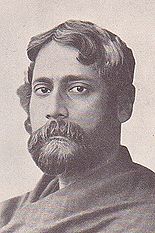- Chitto Jetha Bhayshunyo
-
Chitto jetha bhayashunyo (Where the mind is without fear) is among one of the most quoted poems in India and Bangladesh.
Written by Rabindranath Tagore before India's independence, it represents Tagore's dream of how the new, awakened India should be. The original Bengali poem was translated by the poet himself and was included in the Nobel prize winning Gitanjali in 1912.
Contents
English text
- Where the mind is without fear and the head is held high;
- Where knowledge is free;
- Where the world has not been broken up into fragments by narrow domestic walls;
- Where words come out from the depth of truth;
- Where tireless striving stretches its arms towards perfection;
- Where the clear stream of reason has not lost its way into the dreary desert sand of dead habit;
- Where the mind is led forward by thee into ever-widening thought and action --
- Into that heaven of freedom, my Father, let my country awake.[1]
bAnglA text
- চিত্ত যেথা ভয়শূন্য, উচ্চ যেথা শির,
- জ্ঞান যেথা মুক্ত, যেথা গৃহের প্রাচীর
- আপন প্রাঙ্গণতলে দিবসশর্বরী
- বসুধারে রাখে নাই খণ্ড ক্ষুদ্র করি,
- যেথা বাক্য হৃদয়ের উত্সমুখ হতে
- উচ্ছ্বসিয়া উঠে, যেথা নির্বারিত স্রোতে
- দেশে দেশে দিশে দিশে কর্মধারা ধায়
- অজস্র সহস্রবিধ চরিতার্থতায়,
- যেথা তুচ্ছ আচারের মরুবালুরাশি
- বিচারের স্রোতঃপথ ফেলে নাই গ্রাসি---
- পৌরুষেরে করে নি শতধা, নিত্য যেথা
- তুমি সর্ব কর্ম চিন্তা আনন্দের নেতা,
- নিজ হস্তে নির্দয় আঘাত করি, পিতঃ,
- ভারতেরে সেই স্বর্গে করো জাগরিত॥[2]
This poem was composed most likely in 1900; it appeared in the volume Naivedya(July 1901). The English translation was composed around 1911, when Tagore was translating some of his work into English after a request from William Rothenstein. It appeared as poem 35 in the English Gitanjali, published by the India Society, London, in 1912[3]. In 1917, Tagore read out the English version, (then titled Indian Prayer) at the Indian National Congress session in Calcutta, 1917[4]
As in most of Tagore's translations for the English Gitanjali, almost every line of the English rendering has been considerably simplified. Line 6 in the English omits a reference to manliness (পৌরুষ, pouruSh), and the stern ending of the original, where the father is being enjoined to "strike {the sleeping} nation without mercy," has been softened.
This poem has inspired Indians with its image of a free-thinking, undivided, dynamic nation, and often appears in textbooks. The poem is also popular among liberals in Bangladesh.
See also
References
- ^ Sisir Kumar Das, ed (1994). The English Writings of Rabindranath Tagore, v.1: Poems. Sahitya Akademi. ISBN 817201547X. p. 53
- ^ rabIndra rachanAbalI (West Bengal govt centenary edition) v.1 p. 894 (রবীন্দ্র রচনাবলী (পশ্চিমবঙ্গ সরকার শতবার্ষিকী সং)
- ^ Sisir Kumar Das, ed (1994). The English Writings of Rabindranath Tagore, v.1: Poems. Sahitya Akademi. p. 9
- ^ Prabhat Kumar Mukhopadhyay, rabIndrajIbanIkathA, 1981, p.104
External links
- Quoted by the Prime Minister at VISHWA BHARATI UNIVERSITY (15-Dec-2001)
- Quoted at the 66th Session of the Indian History Congress
- Where the mind is without fear and the head is held high
- Where the Mind is Without Fear
- Bengali Songs - Rabindra Sangeet
Rabindranath Tagore Life PeriodsAspectsPolitical views
Works NovelsStoriesPoetryBhānusiṃha Ṭhākurer Paḍāvalī (1884) · Gitanjali (1910)SongsRabindra Sangeet · "Amar Shonar Bangla" · "Chitto Jetha Bhayshunyo" · "Ekla Chalo Re" · "Jana Gana Mana"Plays and OperasVālmīki-Praṭibhā (1888)Adaptations Places Jorasanko Thakur Bari · Santiniketan · Shilaidaha · Rabindra Bharati University · Visva-Bharati UniversityFamily Categories:- Bangladeshi literature
- Indian poems
- Bengali literature
Wikimedia Foundation. 2010.
